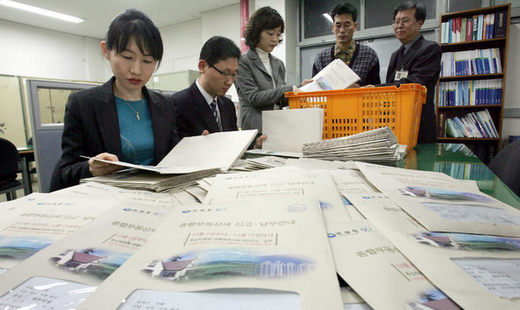 |
|
Officials of a branch of the National Tax Service check documents relating to the comprehensive real estate tax.
|
Homeowners say their purchases were not speculative; others call taxes too low
Public sentiment is divided in relation to the impending comprehensive real estate tax, set to be in place between December 1 to 15. In Seoul's affluent districts, including Gangnam and Seocho, residents are set to launch an anti-tax campaign, while residents in other areas are accusing them of being 'selfish.' In an attempt to curb the rampant real estate speculation that has hit South Korea, for the first time this year the National Tax Service will collect comprehensive real estate taxes for owners of property with a market value of more than 600 million won (US$620,000) The comprehensive real estate tax is in addition to the standard property tax already levied by local governments. Last year, the comprehensive tax was levied on houses worth more than 900 million won, but this year, it will be applied to houses worth more than 600 million won. It is called "comprehensive" because it is tabulated using the cumulative net worth of all of a single individual's property holdings. The law is aimed at curbing speculation through the ownership of multiple properties, especially, and the tax is progressive, its percentage increasing as the real estate value goes up. The number of homeowners expected to have to pay the newly-adjusted comprehensive real estate tax is 237,000, or 1.3% of total homeowners, accoding to the National Tax Service. According to the tax service, 92.3% of comprehensive real estate tax payers will be multiple homeowners. Last month, legislative councils in Gangnam and Seocho submitted an appeal to the National Assembly in an attempt to soften the comprehensive real estate taxes. On November 27, Kim Jin-young, chairman of the Seocho district legislative council, said, "Most residents purchased their homes 20 to 30 years ago, so their transactions were not speculative in nature. Apartment residents plan to appeal soon in order to challenge the constitutionality of the comprehensive real estate tax, as they already pay property tax," Kim said. Residents in Bundang, a wealthy district south of Seoul, have joined the anti-tax campaign. On November 28, an association of apartment residents in Bundang is set to adopt an appeal demanding that the government abolish the comprehensive real estate tax or raise the tax bracket so that it begins with property worth 900 million won. A 42-year-old resident of Bundang said, "I bought a 32-pyeong apartment in 1998 for 140 million won, but I will have to pay the comprehensive real estate taxes despite debts worth 100 million won." In contrast, some citizens were angered by such arguments. In a debate on the Internet portal Daum, an Internet user questioned, "Why are they keeping mum about the fact that their apartment's value has soared upward by hundreds of millions won, while talking about taxes that have only risen by millions of won." Another netizen said that "if residents in Gangnam and Seocho are finding it really difficult to live due to taxes, they will have to sell their properties." In a survey of 1,000 adults taken by poll agency Research&Research on November 25, 78.2 percent said they agreed with the purpose of imposing the comprehensive real estate tax and 59.9 percent supported the imposition of the tax. In addition, two-thirds, or 66.5 percent, answered that the government should toughen the comprehensive real estate tax because the rates are too minimal, compared with the recent gain in home prices. Accountant Cho Young-tae, head of the tax reform center at the People's Solidarity for Participatory Democracy, said, "The comprehensive real estate tax is aimed at taxing huge asset gains from real estate. A principle of the real estate tax system is to lower the transaction tax and to toughen ownership taxes. So far, no scholar or political party has opposed the idea." Please direct questions or comments to [englishhani@hani.co.kr]





